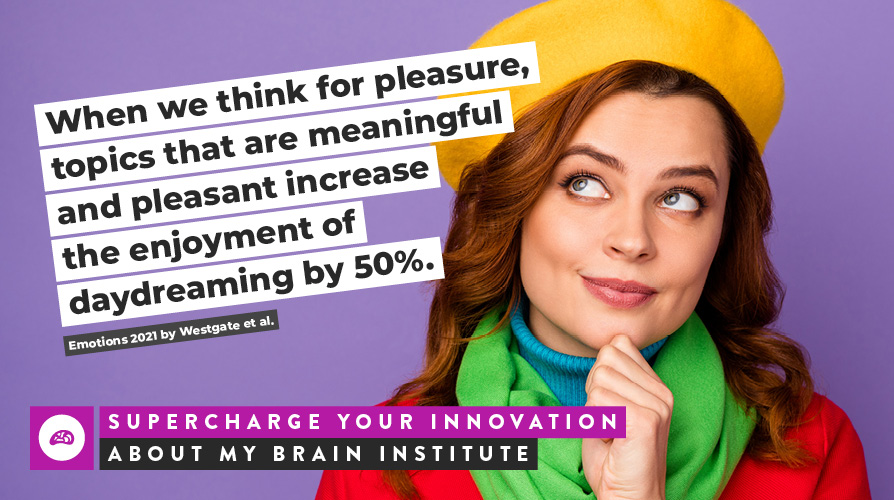The Importance of ‘Daydreaming’
Neuroscience has shed some light on daydreaming or letting the mind wander. Humans spend up to half of their waking hours daydreaming. The ‘decoupling hypothesis’ proposes that when we daydream, brain resources are shifted away from our external environment to our internal environment.1
How Can Daydreaming Become a Tool to Combat Stress?
Our minds often wander during routine, mundane tasks, such as walking the dog or taking a shower. We can still interact with things around us when we daydream because our brain can interrupt these thoughts to give direction, especially if the brain perceives danger or a threat.
What if we suspend disbelief and decide that spending time daydreaming is important? What is obscene wealth if you don’t have time? What is good health if you don’t have time to enjoy your body and existence?
People of any age may remember when someone else told them to ‘get their head out of the clouds’ or some other criticism. Most of us have been scolded while daydreaming-especially when we were younger. Some studies found that in adulthood, mind-wandering was equated with unhappiness because we spent time thinking about negative issues and problems in our lives.2
Daydreaming at work has been positively linked with innovation in the workplace, especially when we use it as a tool to tackle complex problems and challenges. Organisations that want to promote innovation should embrace science and create work environments that encourage daydreaming.3
A recent study4 found that daydreaming should become part of the cognitive toolkit and that many of us do not know how to daydream successfully. The idea of thinking for pleasure may sound odd or even boring. Many of us need to train our brains to daydream properly. Essentially, our imaginations are often unable to use this time for good.
Thinking for pleasure is difficult, especially when we feel pressure and stress from everything around us. Researchers coached a group of volunteers to think ‘meaningful thoughts’, but the volunteers had difficulty doing so. When unguided, people didn’t get much satisfaction from spending the time daydreaming, and when prompted, the research subjects still did not find deep meaning to their thoughts.
Finally, participants were given topics they considered both meaningful and pleasant, and they reported their daydreams to be 50% more enjoyable than when they were allowed to think about anything. Even though these results were promising, the scientists acknowledged the difficulty of daydreaming. It is a skill that can increase our happiness and help us reconstruct our emotions, which is a powerful tool in times of stress.
What Happens to the Brain When We Daydream?
It is estimated that we spend about half of our lives thinking about something other than what we are doing, and research has shown that parts of our brain ‘fall asleep’ when this occurs. Known as local sleep intrusions, scientists believe these moments may explain attentional lapses, impulsivity, and suddenly going blank and forgetting what we were doing.
These lapses may occur more frequently if we are sleep-deprived, and neurons in the brain behave similarly to sleep during these moments. Being tired means we have more difficulty controlling our attention, resulting in decreased performance and fewer opportunities for innovation.
In a recent study5, scientists asked volunteers to complete repetitive, monotonous tasks. The volunteers were asked randomly while completing the task to report their thoughts. They could indicate they were focused on the task, their mind was wandering, or their mind was blank. An electroencephalogram was used during the span of the test.
Researchers focused on ‘slow waves’ because they are indicative of sleep, showing a lapse in neuronal activity. Slow waves occurring at the front of the brain led to impulsiveness, and volunteers reported that their minds were wandering. Slow waves occurring at the back of the brain were related to the mind being blank and sluggish.
The volunteers in the study were young and healthy and had not reported being tired or sleep-deprived. Scientists found the slow waves did correspond to moments of either wandering or blankness. During the experiment, the volunteers worked on repetitive tasks, completely unaware that their brains were going on and offline the whole time.
When Time Suddenly Becomes the Enemy
As children, it seems like things can never come fast enough—the end of school, birthdays, and other celebrations. As an adult, it suddenly seems like we never have enough time to get everything done. We rush frantically from one thing to the next until we get sick or burn out. This isn’t anything to be proud of! We should recognise the sadness here and lament the loss of all those good ideas, daydreams and innovations.
Thinking about the enormity of time is difficult for our brains. Our lives are so short compared to the universe's age, which is estimated to be around 13.8 billion years old.6 80 or 100 human years is nothing compared to the endless grind of time around us. Why, if we are given so little, don’t we do more with it?
Time is the most valuable thing a man can spend.
Theophrastus
But what about daydreaming? Isn’t that a colossal waste of this precious time? No! Science has proven that daydreaming is beneficial. When we let our brains wander, we improve how we solve problems. Isn’t that something a leader should want to improve?
It is important to remember that businesses and companies do not innovate--the people who work for them do.
Innovation does not always come in a split second, but we must consider this time a worthy investment. Employees are already taxed for time, so when we expect quick returns, we will often be disappointed in the long run.
Some leaders may be wary of giving this time to their employees, fearing the time will be squandered or misused. However, this kind of micromanaging will typically stifle innovation altogether. If we cannot trust those we work with, why are they there?
Innovation requires several things, including:
- The time to imagine and daydream. This time is not time wasted but time invested. We cannot innovate at the snap of a finger, so employees need time away from regular duties to focus on idea generation. Regular intervals would be helpful, giving people quiet moments to let their brains soar.
- The freedom to use the time as they see fit. Leaders cannot over-manage and still expect great ideas. Instead, leaders should step back and trust their teams. Create a culture where imagination is celebrated, and ideas will follow.
- The permission to fail. Sometimes, even the most incredible ideas fail. Such is life, but employees need permission to fail to be willing to try out creative ideas. There are no guarantees in business, just as there are none in innovation. People who feel supported will be more inclined to make bold, innovative moves with an even greater payoff.
A Wandering Brain is an Imaginative Brain
When things start to seem stale, try actively finding time to think about nothing. Find a spot where you can relax and then really DO relax. Stop worrying, stop planning your next move, and stop mentally writing emails. Just give your brain and imagination some time alone. You almost want to step out of your mind and look in, if you can picture that.
Contrary to what most people believe, innovation doesn’t always come quickly. Sometimes we need to work at it--by not really thinking about it. It sounds like an oxymoron, but if we indulge ourselves and allow daydreaming, we’ll allow new ideas to surface. How many ideas are potentially being missed?
Read on: The Importance of Imagination.
Citations:
- Kam JWY. The Wandering Mind: How the Brain Allows Us to Mentally Wander Off to Another Time and Place. Frontiers for Young Minds; 5. Epub ahead of print 20 June 2017. DOI: 10.3389/frym.2017.00025.
- Escalante A. New Research Finds Daydreaming Is Good For Our Health. Forbes Magazine, 2021, (2021, accessed 22 January 2023).
- Escalante A. Want To Be More Innovative At Work? Scientists Say To Try Daydreaming. Forbes Magazine, (2020, accessed 22 January 2023).
- Westgate EC, Wilson TD, Buttrick NR, et al. What makes thinking for pleasure pleasurable? Emotion 2021; 21: 981–989.
- Andrillon T, Burns A, Mackay T, et al. Predicting lapses of attention with sleep-like slow waves. Nat Commun 2021; 12: 3657.
- Redd NT. How Old is the Universe?, (2017, accessed 28 September 2020).
- i4 Neuroleader (353)
- Leadership & Culture (336)
- Brain Health & Wellbeing (206)
- Innovation (97)
- Performance (85)
- Our News (79)
- Collaboration (68)
- Agility (53)
- Practitioner Stories (44)
- In The Press (36)
- Make Me A Leader (33)
- Balance (31)
- Integration (30)
- Imagination (29)
- Awareness (23)
- Brain-Friendly Channel (22)
- Brain-Friendly Leadership (22)
- Communication (22)
- Curiosity (21)
- Inspiration (19)
- Intuition (19)
- Attitude (17)
- Courage (16)
- Adaptability (14)
- Case Studies (14)
- Drive (14)
- Generosity (13)
- Ethics (9)
- Mental Readiness (9)
- Influence (8)
- Retreat (8)
- Brain-Friendly Leadership (1)
- Oracle Cards (1)
- 1 November 2025 (2)
- 1 September 2025 (3)
- 1 August 2025 (5)
- 1 July 2025 (5)
- 1 June 2025 (2)
- 1 April 2025 (1)
- 1 March 2025 (8)
- 1 February 2025 (3)
- 1 September 2024 (4)
- 1 July 2024 (2)
- 1 June 2024 (6)
- 1 May 2024 (2)
- 1 April 2024 (3)
- 1 March 2024 (1)
- 1 November 2023 (1)
- 1 August 2023 (1)
- 1 July 2023 (2)
- 1 June 2023 (2)
- 1 May 2023 (4)
- 1 April 2023 (2)
- 1 March 2023 (7)
- 1 February 2023 (4)
- 1 January 2023 (1)
- 1 September 2022 (1)
- 1 May 2022 (3)
- 1 April 2022 (1)
- 1 March 2022 (5)
- 1 February 2022 (4)
- 1 January 2022 (4)
- 1 December 2021 (2)
- 1 November 2021 (4)
- 1 October 2021 (3)
- 1 September 2021 (6)
- 1 August 2021 (1)
- 1 April 2021 (1)
- 1 December 2020 (2)
- 1 November 2020 (1)
- 1 September 2020 (1)
- 1 August 2020 (1)
- 1 July 2020 (3)
- 1 June 2020 (4)
- 1 May 2020 (3)
- 1 April 2020 (4)
- 1 March 2020 (6)
- 1 February 2020 (4)
- 1 January 2020 (2)
- 1 December 2019 (3)
- 1 November 2019 (3)
- 1 October 2019 (5)
- 1 September 2019 (4)
- 1 August 2019 (4)
- 1 July 2019 (4)
- 1 June 2019 (5)
- 1 May 2019 (9)
- 1 April 2019 (9)
- 1 March 2019 (8)
- 1 February 2019 (7)
- 1 January 2019 (8)
- 1 December 2018 (5)
- 1 November 2018 (10)
- 1 October 2018 (16)
- 1 September 2018 (9)
- 1 August 2018 (10)
- 1 July 2018 (9)
- 1 June 2018 (8)
- 1 May 2018 (9)
- 1 April 2018 (9)
- 1 March 2018 (9)
- 1 February 2018 (8)
- 1 January 2018 (8)
- 1 December 2017 (6)
- 1 November 2017 (9)
- 1 October 2017 (9)
- 1 September 2017 (8)
- 1 August 2017 (10)
- 1 July 2017 (8)
- 1 June 2017 (8)
- 1 May 2017 (9)
- 1 April 2017 (8)
- 1 March 2017 (6)
- 1 January 2017 (3)
- 1 December 2016 (4)
- 1 November 2016 (5)
- 1 October 2016 (4)
- 1 September 2016 (2)
- 1 August 2016 (4)
- 1 July 2016 (4)
- 1 June 2016 (2)
- 1 May 2016 (3)
- 1 April 2016 (3)
- 1 March 2016 (7)
- 1 February 2016 (2)
- 1 January 2016 (5)
- 1 December 2015 (2)
- 1 November 2015 (2)
- 1 October 2015 (4)
- 1 September 2015 (2)
- 1 August 2015 (2)
- 1 July 2015 (1)
- 1 June 2015 (3)
- 1 May 2015 (4)
- 1 April 2015 (5)
- 1 March 2015 (3)
- 1 February 2015 (3)
- 1 January 2015 (3)
- 1 December 2014 (3)
- 1 November 2014 (3)
- 1 October 2014 (3)
- 1 September 2014 (5)
- 1 August 2014 (4)
- 1 July 2014 (5)
- 1 June 2014 (3)
- 1 May 2014 (1)
- 1 March 2014 (1)
- 1 December 2013 (2)
- 1 November 2013 (1)
- 1 July 2013 (1)
- 1 June 2013 (1)
- 1 May 2013 (3)
- 1 April 2013 (1)
- 1 March 2013 (2)
- 1 February 2013 (1)
- 1 January 2013 (2)
- 1 November 2012 (1)
- 1 October 2012 (1)
- 1 September 2012 (1)
- 1 August 2012 (2)
- 1 July 2012 (1)
- 1 June 2012 (1)
- 1 May 2012 (2)
- 1 April 2012 (1)
- 1 February 2012 (1)
- 1 January 2012 (1)
- 1 November 2011 (1)
- 1 October 2011 (3)
- 1 September 2011 (2)
- 1 July 2011 (1)
- 1 June 2011 (1)
- 1 May 2011 (1)
- 1 April 2011 (1)
- 1 March 2011 (1)
- 1 February 2011 (2)
- 1 January 2011 (4)
- 1 December 2010 (4)
- 1 November 2010 (3)
- 1 October 2010 (5)
- 1 September 2010 (4)
- 1 August 2010 (4)
- 1 July 2010 (3)
- 1 June 2010 (4)
- 1 May 2010 (7)
- 1 April 2010 (5)
Subscribe by email
You May Also Like
These Related Stories

How Can Human Innovation Thrive in the Era of AI?

The Neurobiology of Imagination - Becoming an Innovative Leader




No Comments Yet
Let us know what you think